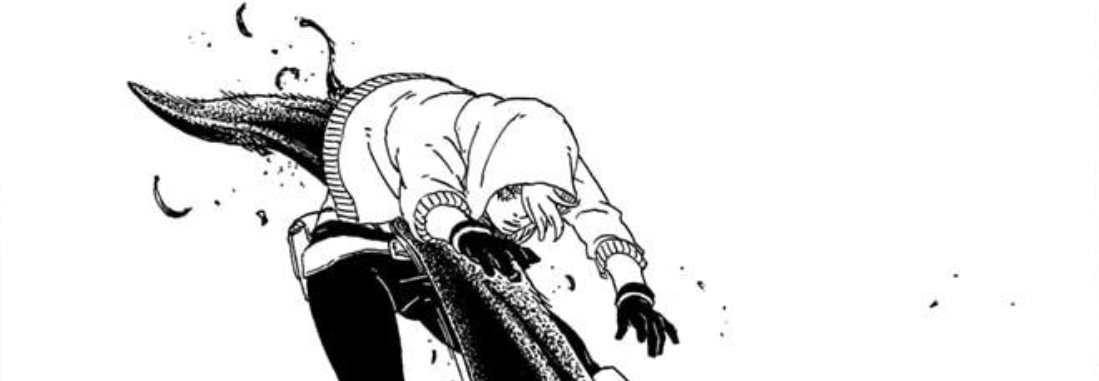Save us, Boruto Anime, You're Our Only Hope
The "death" of Yodo has made the value of the Boruto anime clearer than ever.

It's September 30th, and we've just learned that Yodo is dead.
That's funny, right?
It's 11 days since Boruto: Two Blue Vortex (TBV) released, two months of chapters since Sarada and the rest of the team dispatched to the Sand returned to Konoha, six chapters (meaning six months) since Yodo was lying in the desert, bleeding out. One would think in the intervening time, someone might have directly said that Yodo is dead, mentioned something beyond the word sacrifice, that perhaps the main characters who were on the mission with her, Sarada, Mitsuki, Konohamaru, might have expressed grief or regret that a comrade died on a mission.
Instead, Yodo's death was officially declared via a thin wrapper attached to Volume 6 of TBV, a little strip of paper as easily thrown away and discarded as Yodo herself.
Those of you who've followed me for a long time are probably aware of my opinions on the writing of the Boruto manga: During the Kodachi era, the craft of writing in the story was superior—the pacing was better, the emotions highs higher, the dips deeper. The tools in a writer's toolbox that are used to stir up emotions and create attachments for readers were deployed to greater effect with a more significant impact. That said, I am a staunch Ikemoto defender. I think the things that have been done since he took over the month-to-month writing of the series are more intriguing than what Kodachi was doing. Eida, Code, the Shinju—they're fascinating characters, both in the plot and in terms of functioning as an allegory of our modern world. Ikemoto's story is more intellectual and, ultimately, more interesting.
I don't ask a writer to be everything. It's a little ridiculous to expect a person who excels in one aspect of art to flourish in every aspect. You can often tell where a writer's strengths lie, in characters, in worldbuilding, in plotting, in symbolism, in wordplay. I long ago accepted that Ikemoto is a manga artist first, his primary strength lying in storytelling through art on the page, followed by his plotting and symbolism. Utilizing dialogue, pacing, imbuing poignant moments with gut-punching impact aren't his specialty.
And yet, I find how Yodo's death was handled fairly indefensible, not just for her character, but for the main characters in the story as well. Let's quickly review her role in the second arc of TBV.
Sarada, Mitsuki, and Konohamaru arrive in the Sand to meet up with Yodo and Araya. Their purpose? To use intel given to Shikamaru by Koji to end the lives of two of the five Shinju. Yodo immediately notices that Sarada seems off, still reeling from her blow up with Sumire over Boruto, and asks if she's into a guy; Sarada denies it. Araya and Yodo clash over their differing approaches to saving Shinki, Yodo's passion to rush in and save the boy she likes, Araya's desire to save Yodo from her rashness.
The younger shinobi manage to get Ryu alone. Despite sensing Yodo's bloodlust, he agrees to work with them, setting up an elaborate farce to catch the duplicity of Team Shinki and Team 7. Araya's sword, imbued with Shinki's iron sand magnetism, is their only counter to the Shinju's abilities, but he loses it when trying to defend Yodo from a Claw Grime who has bitten her. This ends in Ryu holding Mitsuki and Araya hostage, demanding intel about Boruto from the girls. When Sarada refuses, Yodo realizes that her feelings for Boruto are similar to Yodo's feelings for Shinki. Yodo then steps up, offering her sensory abilities to Ryu in exchange for letting her teammates go. Ryu's response is to impale her through the stomach with iron sand.
In Yodo's final moments, she says she can now hear Sarada's inner turmoil, telling her it's okay if she awoke her Mangekyo Sharingan (MS) for the love of one person rather than for the benefit of everyone. She tells her not to hold back anymore, to stop suppressing that power inside her. This leads to Sarada reawakening her MS, acknowledging her feelings and powers. As she says: "Cuz if I run away from myself, I can't tackle the reality in front of me. Can't save a single person."

While Yodo's death empowers Sarada, it causes tension between Koji and Boruto, the latter realizing his partner is willing to sacrifice the lives of others to meet his goals. The last mention we have of Yodo in the Sand is Mitsuki telling Konohamaru that Yodo is carrying her and Ryu's Thorn Soul Bulb to go save Shinki.
How do others react to Yodo's demise (now that it's been acknowledged that she is indeed dead)? For Boruto, it signals a split in his alliance with Koji. While we know Boruto acted on his own by contacting Kawaki, he's is now openly questioning Koji's methodology while withholding his own dealings with Momoshiki. Whereas Yodo's death haunts Boruto, Sarada fails to mention it in chapter 25. Instead, the narrative chooses to have Sarada discuss Boruto with Sumire, her realization of her feelings taking priority over the fact that she just watched another young shinobi die.
I don't see Sarada's response as a character flaw—it's a writing flaw, a pacing flaw, the desire of a writer to move on to the next part of the story without resolving the previous arc. However, the entire Sand arc falls flat because of how Yodo's death was handled. It's not just because we didn't know Yodo well, didn't explore her character more, didn't spend time with her so that we valued her as readers—though that's a part of it. It's also because we failed to see her death impact Sarada or any of the other characters who were on the mission with her—Mitsuki, Konohamaru, Araya, even Shikamaru who arranged for her to be sent to her death at Koji's orders. The individual who is most affected is Boruto who wasn't on the mission and didn't witness her death, but while he is feuding with Koji, Sarada and Sumire are talking about how oblivious he is to their affections. Contrast this to Shikamaru's reaction to his friends' injuries during the Sasuke Retrieval arc.
This is not to say that the plot itself is wrong. It's fairly easy to draw a line from Yodo's death to Sarada's exposition on her feelings for Boruto. All the pieces are there, but the story failed to put them in place: Sarada realizes that she's failed in denying her feelings for Boruto, that if she'd opened up sooner, she might have been able to save Yodo, a friend. Continued denial not only endangers those around her, but it also endangers her friendship with Sumire. After losing one friend, can she really risk losing another by not acknowledging their shared attraction to Boruto?
The manga does none of that, skipping from Yodo being carried away by Araya to Sarada walking into Moegi's hospital room and seeing Sumire. There's no recognition of the trauma of the fight, of the pain of watching a fellow teammate die in front of you, sacrificing herself to save everyone else. It's an unacceptable omission from a writer, and it can only be excused if we view the manga as an outline for the anime to follow rather than a self-contained story.
More than any other moment so far in TBV, Yodo's death makes an argument for how desperately we need the Boruto anime to return and clean up the rough edges of Ikemoto's storytelling, to take the skeleton he's laid out and add muscle, ligaments, fat, and skin, to make the story come alive. The plot is strong, the stakes are high, but at the heart of every story lies strong characters and their actions and reactions to events as they unfold. The manga has yet again failed to deliver this, giving us bones when what we need is a body.
The writing of Yodo's death in the manga is equivalent to the animation of Kagura's death in the anime, so poorly done that it decreases the overall quality of a much-maligned franchise. Even for its biggest advocates, it's inexcusable and needs to be rectified. Despite the poor-animation quality during Kagura's death, it actually meant something to the characters who witnessed it, the loss written on their faces and into the plot as the Funato arc went forward. Even with bad art, the storytelling itself was far superior to what we were just given in TBV.

The only way this can be defended is if we recognize the value of the anime and the work it's going to have to do to uplift the manga content. What Mr. Mugino's death was for Boruto, Yodo's death needs to be for Sarada
